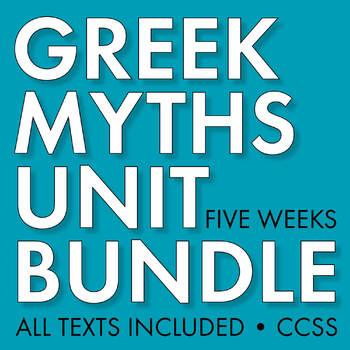GREEK MYTHOLOGY Unit Plan for Teens, Ancient Greece, Five-Week Myth Unit, CCSS
- Zip
- Prezis
What educators are saying
Description
Looking for a Greek mythology unit for an older audience? Take those beloved mythological stories and ramp them up with this bundle of five weeks of complete lesson materials designed for advanced middle school students and high school freshmen/sophomores as they connect their studies of Greek mythology to our modern world and their own lives. Everything you’ll need is included; no textbooks needed.
This Greek mythology unit is one of my students’ favorites of the year. I’ve used it successfully with eighth graders and both regular and honors freshmen. It covers the important elements of Greek mythology and provides an excellent background before my freshmen launch their study of Homer’s epic poem, The Odyssey.
This bundle includes:
• A day-by-day calendar to follow with helpful details and nightly homework assignments (read this file first when you open the bundle)
• Full-text copies of 12 Greek myths in the public domain (including: the creation story of Gaea and Uranus, Kronos and Zeus, Prometheus, Pandora, Demeter, Psyche and Eros, Daedalus and Icarus, Narcissus and Echo, Orpheus, Midas, Theseus, and Perseus)
• Instructions/Rubric for a binder project to help students organize their work
• Notesheet template with one completed sample to show your students the depth-of-thought you’re requiring for them to earn full points as they read each myth
• 8 Quickwrite topic slides to help students connect themes of the Greek myths to their own lives
• Culturally diverse creation story jigsaw reading and writing activity
• Creative characterization assessments, including character cell phone, video channel, and job application worksheets
• Master list of 50 flashcard characters from the Greek myths (also included on day-by-day calendar)
• Essay assignment
• 40-question end-of-unit exam with answer key
• Hero’s Journey overview lecture (this is a free item in my shop)
• Hero’s Journey speech assignment, list of modern film topics, and a grading rubric
This is a total of 104 pages/slides (uneditable PDF and Prezi format).
Note: The Culturally Diverse Creation Myth Jigsaw activity, Cell Phone Characterization, Video Channel Characterization, Job Application worksheet, and Hero's Journey speech assignment are all sold separately in my store. No need to purchase these items separately if you grab this budget-priced bundle. All other items are available only as part of this bundle.
Thanks for stopping by!





